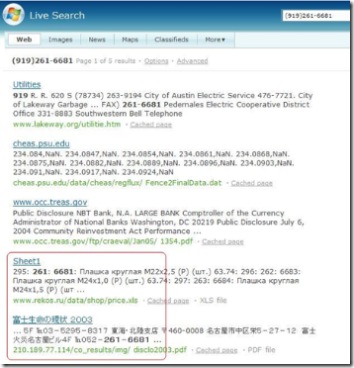Who called me?
I happened to check my mail last night from home and noticed a missed call notification for my work phone in my mail inbox (one great feature about phone+Outlook integration). It's from some guy with a caller ID with number 919-261-6681 on it. Hmm... who could this be? Just a few hours before , I happened to submit my work phone to Edmunds.com since I am in the market for a new car. I though this could be from some dealership trying to sweet talk me on Independence day.
However, the area code looks somewhat suspicious since I'm mostly in 425 or 206 area. I listened to the voice mail (via Outlook, another great feature) and the message went something like this:
"Hi, this is John blah-blah-blah with WBB. When you get a moment, please give me a call back at 408-649-5601. Thanks!"
I have no idea who this person is. Definitely wrong number.
But wait, why doesn't the caller ID number matches the number that he wanted me to call back. So, with this curiosity in mind, I set out to find what/who could this person be and what he wanted to do with me.
So I sat out to search for the phone number and see if I'd hit anything. Let's try our mothership, Live Search first.
"9192616681" returned no results.
"(919)261-6681" returned 5 non-relevant results. Mostly companies with phone number 261-6681 (which is good), but the area code is different. Even worst, the last 2 results were phone numbers from Russia and Taiwan respectively.
"919-261-6681" returned even more astounding results. A mathematical formula!
Enough is enough. Let's try our competition, Google.
"9192616681" returns 2 relevant hits.
"(919)261-6681" returns 33 results. Except for the first 2 results (which are also the same results as the "9192616681" search term, the rest are junk.
"919-261-6681" returns 3 relevant hits. All of them are associated with the phone number that I'm interested in.
I know that Live Search is really beefing up in a lot of areas, especially their image search technology, but I have to admit that in my case, GOOG wins. This is probably another reason why creating a generic search interface which would understand a human intention is very difficult. To quote John Battelle, "Search is at best 5% solved--we're not even in the double digits of its potential.". This is so true in this regards.
BTW, from the search results, I didn't even bother to return John Blah-blah-blah guy from WBB.

